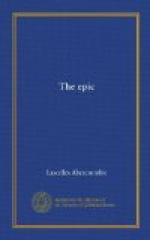“From Homer,” said Goethe, “I learn every day more clearly, that in our life here above ground we have, properly speaking, to enact Hell.” It is rather a startling sentence at first. That poetry which, for us, in Thoreau’s excellent words, “lies in the east of literature,” scarcely suggests, in the usual opinion of it, Hell. We are tempted to think of Homer as the most fortunate of poets. It seems as if he had but to open his mouth and speak, to create divine poetry; and it does not lessen our sense of his good fortune when, on looking a little closer, we see that this is really the result of an unerring and unfailing art, an extraordinarily skilful technique. He had it entirely at his command; and he exercised it in a language in which, though it may be singularly artificial and conventional, we can still feel the wonder of its sensuous beauty and the splendour of its expressive power. It is a language that seems alive with eagerness to respond to imagination. Open Homer anywhere, and the casual grandeur of his untranslatable language appears; such lines as:
amphi de naees
smerdaleon konabaesan ausanton hup’
Achaion.[6]
That, you might say, is Homer at his ease; when he exerts himself you get a miracle like:
su den strophalingi koniaes
keiso megas megalosti, lelasmenos hipposunaon.[7]
It seems the art of one who walked through the world of things endowed with the senses of a god, and able, with that perfection of effort that looks as if it were effortless, to fashion his experience into incorruptible song; whether it be the dance of flies round a byre at milking-time, or a forest-fire on the mountains at night. The shape and clamour of waves breaking on the beach in a storm is as irresistibly recorded by Homer as the gleaming flowers which earth put forth to be the bed of Zeus and Hera in Gargaros, when a golden cloud was their coverlet, and Sleep sat on a pine tree near by in the likeness of a murmuring night-jar. It is an art so balanced, that when it tells us, with no special emphasis, how the Trojans came on with a din like the clangour of a flock of cranes, but the Achaians came on in silence, the temper of the two hosts is discriminated for the whole poem; or, in the supreme instance, when it tells us how the old men looked at Helen and said, “No wonder the young men fight for her!” then Helen’s beauty must be accepted by the faith of all the world. The particulars of such poetry could be enumerated for pages; and this is the poetry which is filled, more than any other literature, in the Iliad with the nobility of men and women, in the Odyssey with the light of natural magic. And think of those gods of Homer’s; he is the one poet who has been able to make the dark terrors of religion beautiful, harmless and quietly entertaining. It is easy to read this poetry and simply enjoy it; it is easy to say, the man whose spirit held this poetry must have been divinely happy. But this is the poetry whence Goethe learnt that the function of man is “to enact Hell.”




